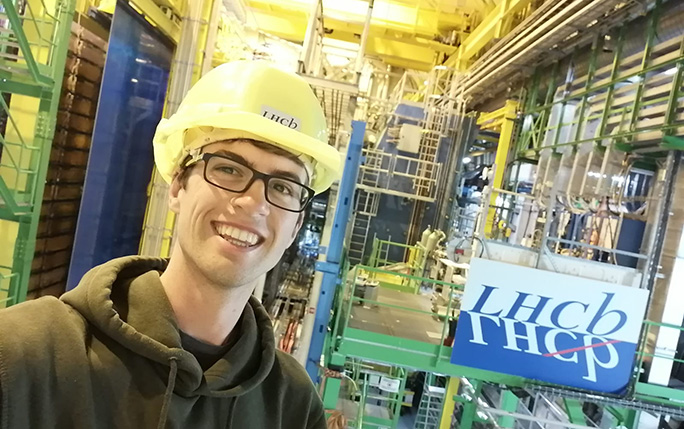CDT Student Interviews – Spotlight on Phillip Marshall

The new series of 'CDT Spotlight Interviews' gives you a personal insight into work, motivation and challenges of our students. For this interview we have spoken with Phillip Marshall who joined the CDT in 2017.
Why are you interested in Physics?
“Physics was always a subject I found fascinating and the only one I considered pursuing to university. I started with the excitement of being able to learn about the workings of the universe at every scale, from quantum physics to cosmology. A side of physics I did not appreciate until more recently however is the importance of critical thinking and a good grasp of statistical ideas to better interpret everyday life: “Are the numbers politicians are producing really accurate?” for example.”
Why do you think Big Data is important?
“Big Data is everywhere and data scientists are needed to harness it. I undertook a placement in the railway engineering sector during my PhD and I was astonished at the possibilities to improve efficiency and safety in the industry if more data was collected and the data already collected was used to its potential. It gave me an insight into how many industries must be adapting to the new world of big data and how big data is a great place to be at the moment. I also learnt the challenges to building a big data future. Currently data is often held by many different parties and in many different formats. Managing this mess to accumulate large, structured and useful datasets is the important first step needed to really see the benefits of big data.”
What were your biggest misconceptions about working as a researcher before starting your PhD?
“By the time I decided to do a PhD I think I knew enough PhD students and researchers to not have too many misconceptions. But I think something I have learnt is that you don’t have to be Einstein to pursue a career in physics; researchers are normal people, but people with a great passion for what they do. That is the most important thing. Perhaps my only misconception was thinking I would survive without coffee!”
Which of your experiences or achievements would you use to recommend pursuing a PhD?
“Living abroad is an amazing privilege. Experiencing different cultures and meeting new people has been a highlight of my PhD and something I will always treasure. Whether they are excellent researchers or friends from the local sports team, I have met people I may well know for the rest of my life. In terms of achievements I am now a much more accomplished speaker and have really built confidence in myself when I present my work.”
Has your PhD experience so far convinced you to pursue an academic career or are you more interested in applying your skills in industry?
“For me, moving into industry has always been the goal. Before I started I had very little experience of big data or computer science and my PhD has taught me almost everything I know. It has not swayed me to look towards an academic career. The chance to do an industry placement has been incredibly valuable for me and has opened my eyes to the big data world available to me.”
Has Covid-19 impacted your research?
“At the time Covid hit I was on my industry placement in Newcastle. Luckily for me my work there was not affected other than having to work from home, of course. Now I am back to my main research and still working from home which, although being less social, is still possible. As with many big data students my work is all computer based and I am spending much of my time writing chapters for my thesis which is never easy, at home or in the office!”
At this point in your PhD, what is the achievement you are most proud of?
“I find it difficult to decide on a single achievement. Every opportunity to share my work is exciting. I have exhibited posters and given talks and get a thrill out of it each time. I also find real satisfaction in outreach work, something I had never considered before I started a PhD. In the summer of 2019 I helped host A-level students at CERN and had a great time talking to them about machine learning, physics and the life of a PhD student. It was great to see and perhaps even inspire the next generation of physicists.”